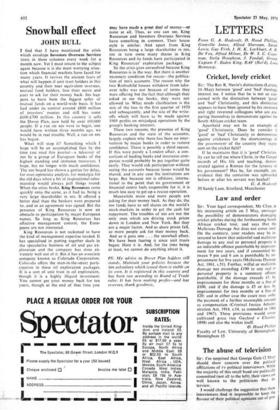Snowball effect
JOHN BULL
I find that I have mentioned the crisis which envelops Investors Overseas Services
(los) in these columns every week for a month now. Yet I must return to the subject again because it is the most worrying situa- tion which financial markets have faced for many years. It revives the ancient fears of what will happen if unit trust holders in this country and their near equivalent overseas, mutual fund holders, lose their nerve and start to ask for their money back. Ios hap- pens to have been the biggest seller of mutual funds on a world-wide basis. It has had under its control around £800 million of investors' monies and still has some £6004700 million. In this country it sells the Dover Plan, now held by over 100,000 people. If a run on los were to begin, one would have written three months ago, we would be in real trouble. Well, a run on los has begun.
What will stop it? Something which I hope will be an accomplished fact by the time you read this journal—a takeover of los by a group of European banks of the highest standing and immense resources; I hope, but no longer with much confidence. The los board has shown a genius for delay, for over-optimistic analysis, for nostalgia for the old days when a bit of inspirational sales- manship would always pull things round. When the crisis broke, King Resources came quickly onto the scene, as it had to, being a very large shareholder in los. It offered a better deal than the bankers were prepared to, and so an agreement was signed. But the presence of King Resources is now an obstacle to participation by major European names. So long as King Resources has effective management control, the Euro- peans are not interested.
King Resources is not reckoned to have the kind of management expertise needed. It has specialised in putting together deals in the speculative business of oil and gas ex- ploration and the company has done ex- tremely well out of it. But it has an associate company known as Colorado Corporation. Colorado offers the man-in-the-street parti- cipation in these oil exploration packages. It is a sort of unit trust in oil exploration, though it is a highly illiquid investment. You cannot get your money back for ten years, though at the end of that time you
may have made a great deal of money—or none at all. Thus, as one can see, King
Resources and Investors Overseas Services have something in common. Their house style is similar. And apart from King Resources being a large shareholder in los, los in turn owns many shares in King Resources and its funds have participated in King Resources' exploration packages.
So the crisis goes unresolved because King Resources is in the way. But there is another necessary condition for rescue—the publica- tion of ros's accounts. The reason why the two Rothschild houses withdrew from take- over talks was not because of terms they were offering but the fact that although they asked to see the books, they were not allowed to. What needs clarification is the size of the loss in the first quarter of 1970 and subsequently, and the size of the write- offs which will have to be made against 1969 profits on misjudged operations by the group's banking interests.
These two reasons, the presence of King Resources and the state of the accounts, largely explain why there has been no inter- vention by major banks in order to restore confidence. There is possibly a third reason. If this were purely a London affair, a con- sortium of leading banks and insurance corn- panies would probably be put together quite easily. They would risk participation without seeing the accounts because losses would be shared, and in any case the institutions are large. But because los is offshore, interna- tional to the point that no government or financial centre feels responsible for it, it is much less easy to get up a rescue operation.
Meanwhile more and more people are asking for their money back. As they do, the los funds have to sell shares on the world's stock-markets in order to get the cash for repayment. The troubles of tos are not the only ones which are driving stock prices down in London and New York. But they are a major factor. And as share prices fall, so more people ask for their money back. And so it goes one . . . the snowball effect. We have been fearing it since unit trusts began. Here it is. And, for the time being at least, we cannot do anything about it.
PS: My advice to Dover Plan hojelers still stands. Maintain your policies because the ms subsidiary which issued them is viable on its own. It is registered in this country and has been run according to Board of Trade rules. It has been making profits—and has reserves, thank goodness.


































 Previous page
Previous page